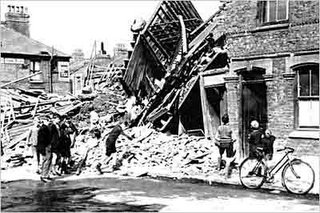Mum, there's a bomb in the kitchen!
 Living in Mortlake on the outskirts of London during World War II was a dangerous proposition. Walter never went into much detail about bombs and air raids and such in his letters to me. As I mentioned in a previous post, a few bombs raining down on him was small stuff after all he'd faced in his life. His letters gave more of a history lesson than personal details:
Living in Mortlake on the outskirts of London during World War II was a dangerous proposition. Walter never went into much detail about bombs and air raids and such in his letters to me. As I mentioned in a previous post, a few bombs raining down on him was small stuff after all he'd faced in his life. His letters gave more of a history lesson than personal details:It was September 1940, and the Battle of Britain was being fought in the skies of Surrey and the nearby towns. Many damaged planes, both British and German, were continually being brought through Kingston for examination. We had them zooming over County Hall, and everyone sought cover. Eventually, the Germans were outfought, and flew back across the Channel to lick the wounds. October was a dreadful month. Heavy bombing took place at night, and much damage was caused, especially to the churches. That was Goering’s technique.
The country was going through a very serious crisis, but our Prime Minister and War Defence Minister Winston Churchill inspired the country to stand firm. After the heavy bombing, came along the flying bombs. They were like a lot of mosquitoes and cause a lot of damage. Incendiary bombs too were introduced which caused a lot of damage.
His son Ron, however, did tell me a couple of tales about what life was like in Mortlake during the war. In one, Ron came as close to a bomb as one could and live to tell about it. Late one afternoon while Walter was still at Kingston County Hall, Ron went to the kitchen for a glass of milk. He heard a tremendous noise overhead that stopped him in his tracks at the center of the room. Within moments, a bomb crashed through the ceiling and landed on the floor next to him. It didn't explode or break through the floor. It just rolled around at Ron's feet.
As a 14-year-old, Ron found this exciting and ran out to tell May, who - wisely - found it exciting in a completely different way. Was it a dud? Or would it explode any moment? They quickly rolled the bomb out to the garden, expecting to be blown to bits before the task was done. After getting help, the bomb was inspected, deemed a dud, and carted off to wherever dud-bombs were laid to rest.
Ron told me that many people working in German bomb factories were not sympathetic to the Nazi cause and often sabotaged the explosives they were manufacturing. He said that, thankfully, many of the bombs dropped on London were duds (as opposed to unexploded bombs). As bad as things were, they could've been worse. Hats off to the dud-bomb-makers of Germany!

0 Comments:
Post a Comment
Subscribe to Post Comments [Atom]
<< Home